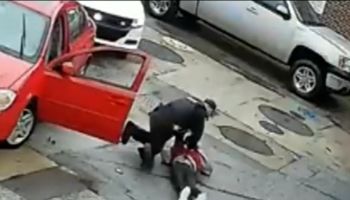Marley Marl was the house producer of the Juice Crew, known for The Bridge Wars, a feud with Boogie Down Productions seen as one of the earliest and influential hip hop beefs. The Juice Crew included Big Daddy Kane, Biz Markie, Roxanne Shanté, Kool G Rap, MC Shan (his cousin) and Masta Ace, and produced many songs for outside artists including King Tee, LL Cool J, and Lords of the Underground. He was also an important figure in the careers of Eric B. & Rakim, producing their first hits “My Melody” and “Eric B Is President”.
Marley Marl was one of the pioneers of sampling in hip hop. He was the first to sample a breakbeat and reprogram it, which he did with The Honey Drippers’ “Impeach the President” breakbeat on the MC Shan single “The Bridge” from 1985. This was an extremely important feat as it completely changed the way hip hop beats were made, as well as other sample based genres. In his early records, Marl mixed James Brown samples and synthetic beats in a fashion previously unheard of, for the most part.
Marl started his career working for Tuff City records. He debuted as an electro producer, with his own track called “DJ Cuttin” in 1985, released under the pseudonym NYC Cutter. Soon however, Marl’s records became more sample heavy, as can be seen by comparing the MC Shan LPs Down By Law (1987) and Born to be Wild (1988); the rhythms became less electronic, with drum machines becoming more prominent.
One of hip-hop’s first superproducers, Marley Marl was an early innovator in the art of sampling, developing new techniques that resulted in some of the sharpest beats and hooks in rap’s Golden Age. As the founder of Cold Chillin’ Records, Marl assembled a roster filled with some of the most prominent hip hop talent then working in New York: MC Shan, Big Daddy Kane, Biz Markie, Roxanne Shanté, Kool G Rap & Polo, and Masta Ace. His production work for those and many other artists generally boasted a bright, booming, and robust sound that — along with his ear for a catchy sample — helped move street-level hip-hop’s sonic blueprint into more accessible territory. Most important, though, were his skills as a beatmaker; Marl was among the first to mine James Brown records for grooves and also learned how to craft his own drum loops through sampling, which decreased hip-hop’s reliance on tinny-sounding drum machines and gave his ’80s productions a fresh, modern flavor.
The end of the ’80s is often referred to as hip-hop’s Golden Age, a time when the form’s creativity was expanding by leaps and bounds. Marl’s Juice Crew was an important force in ushering in this era thanks to its advances in lyrical technique and the distinctive personalities of emerging stars like Biz Markie and Big Daddy Kane. With business at Cold Chillin’ booming, Marl put out the first full-length release under his own name in 1988 (he’d previously recorded the single “DJ Cuttin'” in 1985 with the alias NYC Cutter). In Control, Vol. 1 was mostly a showcase for various Juice Crew affiliates to strut their stuff, notably on the larger-than-life posse cut “The Symphony.” Marl scored his greatest crossover success in 1990 by helming LL Cool J’s Mama Said Knock You Out; bolstered by Marl’s state-of-the-art production, the album restored LL’s street cred while becoming his biggest seller ever, making Marl an in-demand remixer. 1991 brought the release of In Control, Vol. 2, which unfortunately displayed signs that the Cold Chillin’ talent pool was being depleted.
After working with TLC on their 1992 debut, Marl remained mostly quiet for a few years; 1995 brought the release of House of Hits, a retrospective of his best productions over the years. Splitting off from Cold Chillin’, Marl spent several years in a legal battle over money and ownership rights that, in 1998, finally resulted in his being awarded control of all the songs he’d produced for the label. In the late ’90s, Marl’s status as a high-profile producer was restored thanks to his work with artists like Rakim, Queensbridge’s own Capone-N-Noreaga, and Fat Joe. In 2001, Marl put together another compilation of original productions with guest rappers for the British BBE label, titled Re-Entry. [1] In 1994, Marley Marl was referenced on Biggie Smalls’ track “Juicy” as being one of his early influences.
In September of 2007, Marley Marl received an award from the Berklee College of Music for his contribution to music. Marley Marl has also been a legend as a radio deejay along side Mr. Magic in the 80’s on a show called Rap Attack on WBLS New York. Marley took the torch to start his own radio show called Private Radio, later with Pete Rock and K-Def. The radio show was called Future Flavas that was an online station and radio show that bounced around from New York radio stations like Hot 97, Power 105.1. Now Marley is currently back where it all started, WBLS, with his radio show called Golden Era Radio. Marley is still touring the world deejaying playing his brand of funk for the real Hip Hop fans. He is also in the works of producing a film called The Vapors. The film will be based on Marl and the Juice Crew in the late 80’s the golden era of Hip Hop.
He and KRS-One released Hip-Hop Lives in May 2007 with Marley Marl as the executive producer.
On June 5, 2007, Marley Marl suffered a heart attack. He was released from the hospital a few days later on the 8th. According to an interview in The Source, he blamed the heart attack on stress brought on by his worries about being a good father.
In 2008, Craig G and he released a collaborative album titled Operation: Take Back Hip-Hop.
Marl’s music has had influences on RZA, DJ Premier, as well as Pete Rock, who is also a longtime friend.Marley Marl is also a legendary DJ member of the The worldwide DJ organization, The Core DJ’s.















